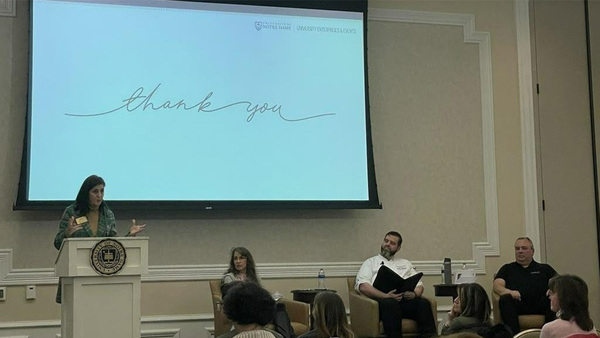
Introduction:
In commemoration of Walk the Walk Week celebrating Martin Luther King Day, Embrace, University Enterprises and Events' Diversity, Equity, and Inclusion initiative, organized a thought-provoking panel discussion on the pervasive issue of food insecurity. This event aimed to shed light on the global and local dimensions of food insecurity, emphasizing the need for collective action within Indiana and Midwest communities.
Food insecurity is a complex challenge, defined by the limited availability of sufficient nutritionally adequate and safe foods or the constrained ability to acquire nourishment in a socially acceptable manner (P. Rabbitt et al., 2023). It is essential to understand that this can range from “Low Food Security” meaning food insecurity without hunger to “Very Low Food Security'' meaning food insecurity with hunger. Conditions which affect as many as 783 million or 9.8% of people worldwide with over 333 million experiencing acute food insecurity (World Food Programme, 2023).
Additionally, the complexity of this issue may intensify with the growing threat of climate change affecting food production worldwide. This serves as a poignant reminder of how our everyday activities, purchases, and practices significantly contribute to the broader landscape of food insecurity.
Panel Discussion:
Led by Karim Tinoco, sustainable foods & kitchen program manager, the panel brought together key voices on the matter. Chef Seth Vanderlaan, director of culinary, Three Leaf and Experience Notre Dame; Jocelyn Antonelli, director of nutrition services for Experience Notre Dame and Campus Dining; and Jim Conklin, co-founder and executive director of Cultivate Food Rescue, shared insights and perspectives on addressing food insecurity.
Impact of Food Insecurity:
Beyond the statistics, the panel highlighted the profound impact of food insecurity, particularly on children. Jocelyn Antonelli underscored the urgency of the issue by emphasizing its ripple effects—chronic health conditions, compromised development outcomes, diminished physical activity, and the onset of mental health issues stemming from insufficient caloric intake and lack of a nutritious diet. Antonelli's insights painted a vivid picture of the multifaceted challenges that underscore the critical need for addressing food insecurity in our communities.
Chef Seth's Tips:
Chef VanderLaan offered a variety of socio-economic solutions, emphasizing concepts such as farm shares, buying local at farmers' markets, and the mitigating effect of purchasing the whole animal. Following these approaches, VanderLaan delved into practical at-home solutions to extend the shelf life of perishable products. Moreover, he generously shared recipes tailored for food items nearing the end of their shelf life. These practices serve to mitigate the over 80 million tons of food wasted annually in the U.S. and underscore the importance of individual actions in reducing this staggering figure.
Cultivate Food Rescue:
Jim Conklin, the driving force behind Cultivate Food Rescue in South Bend, passionately enlightened the audience on the pivotal role his organization plays in local food waste prevention. Cultivate stands as a catalyst for change, rescuing food at every stage of the supply chain to combat the pervasive issue of food waste. Conklin emphasized that the primary challenge in addressing food insecurity lies in logistics, rather than food production.
Cultivate's food rescue hub operates as a powerful solution, salvaging food from diverse sources including farms, universities, 4H, restaurants, and food distributors – items that would otherwise meet disposal. The rescued food is then channeled into a network of charitable outlets, serving local food pantries, the Boys & Girls Club, Backpack Programs in schools, Ronald McDonald House, Veterans Affairs, and various food kitchens.
Conklin then noted the pivotal role The University of Notre Dame has played as Cultivate’s founding partner, consistently making substantial food donations, and serving as a storage unit while Cultivate’s new cold storage facility is constructed. A service the university wholeheartedly takes on in exchange the life-changing service Cultivate provides.
This partnership exemplifies a sustained commitment to addressing food waste and insecurity. Conklin's observations underscore the power of strategic and coordinated efforts at the community level, showcasing how collaborative initiatives can truly make a tangible impact in combating both food waste and insecurity.
Conclusion:
In summary, the panel discussion not only underscored the urgent necessity for community awareness but also emphasized the imperative for proactive measures against food insecurity. As we grasp the profound impact of this issue and internalize the practical insights shared by Chef VanderLaan, alongside Jocelyn Antonelli's poignant words highlighting the critical role of nutrition, each individual emerges as an agent of change, contributing to a future defined by sustainability and food security. The exemplary efforts of organizations like Cultivate demonstrate the transformative power of collective action in making a substantial difference in the lives of those grappling with food insecurity. This Martin Luther King Day, let us respond to the call for action by nurturing a community that steadfastly supports and uplifts its most vulnerable members, embodying the spirit of compassion and unity.
Interested in volunteering at Cultivate Food Rescue?
Visit https://cultivatefoodrescue.com/volunteers for details.